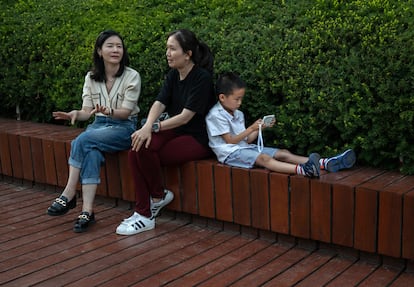China proposes an ambitious plan to prevent internet addiction in children
The Cyberspace Administration proposes that developers create a ‘minor mode’ that offers content based on age and establishes time limits on devices

Chinese authorities have resolved to put the brakes on children’s social media addictions and control the content that children and teens consume online. The Cyberspace Administration of China (CAC), the country’s primary internet regulatory organ, has proposed that manufacturers of mobile devices, operating systems, applications and app stores create a new function called “minor mode,” which will involve a system of age-based content classification and establish time limits for use of the smart terminals. The proposal will be open to comments until September 2, and the timeline of its implementation has not been established. The project, which has been well-received by many parents, could bring a new challenge for tech companies, who face an increase in government intervention.
Though most smart devices already have pre-installed parental control functions, CAC’s plan is much more ambitious. According to the description on its website, the proposal involves connecting mobile phones directly with app stores and apps themselves, so that the minor mode can be activated with a single click. The function will allow the user to access an interface adapted to their age. It can be disabled only with an adult’s verification and authorization.
Once activated, warning notifications will be sent when the device has been used for more than 30 minutes continuously. Applications will not function between ten p.m. and six a.m. During those hours of inactivity, however, certain functions will be permitted, such as emergency calls or the use of educational platforms or others approved by the user’s parents.
The system will be divided into five intervals according to age: below 3 years old, 3 to 8 years old, 8 to 12, 12 to 16 and 16 to 18. The time limits will also vary according to the group: 40 minutes for those younger than 8, an hour for those between 8 and 16 and up to two hours for teenagers between 16 and 18 years old.
The text urges content creators to offer age-appropriate products and information. The CAC suggests that they “promote the fundamental values of socialism” and “traditional Chinese culture” in order to “cultivate minors’ morals and affection for their country.”
A draft, not a regulation
Tom Nunlist, an associate director at the consulting firm Trivium, emphasizes in a phone call that the proposal “is not a regulation.” “It’s about showing CAC’s vision of what it wants to do, which is basically creating a kind of mobile internet for children,” the analyst explains. “The CAC wants to complement measures that already existed, with the idea that the parental control of applications and games become systematic on all devices, offering parents a very simple tool to activate it,” Nunlist says.
Regulators in Beijing have long been concerned about rising rates of myopia and warning of the harmful impact of rampant internet addiction among young people. In 2020, the Law for the Protection of Minors was updated with the inclusion of an entire chapter dedicated to defending the rights of children and adolescents on the internet. There the regulatory campaign against some of the country’s big tech companies has its origins. In 2022, the CAC published a new regulation on the online protection of minors, updating a 2016 draft that was never adopted. The 2022 regulation also remains in draft form.
“Between online classes and leisure time, she is exposed for many hours. If I’m not using my cell phone, she has it, and if not, she takes her mother’s,” says Ouyang, a father particularly concerned about the time his six-year-old daughter spends in front of screens, “not because of the content, but because of her eyes.” “I don’t think this measure will change the fact that today’s children can’t live without phones, but it’s certainly a good initiative,” he says in a park in the capital city.
According to current regulations, Chinese social networks require users to register with their real name, which is verified with the national identity card or a cell phone. Technology companies are obligated to include a “youth mode” to control the games and content of users under 16 years of age. Many platforms for watching, creating and sharing videos, such as Bilibili, Kuaishou and Douyin (the Chinese version of TikTok, also operated by ByteDance) have applied limitations since 2019.
“Spiritual opium”
In addition, in 2021, the time minors can play video games was restricted to three hours a week, after a state-run newspaper branded one of the video game company Tencent’s smartphone games as “spiritual opium.” Still, the restrictions can be easily circumvented, as many minors use their parents’ accounts.
While the announcement caused some turmoil in the markets — the share prices of Tencent (-3%), Weibo (-4.8%), Bilibili (-7%) and Kuaishou (-3.5%) fell following the release of the draft — Tom Nunlist believes that the impact on the industry will be minimal, given that it is already highly regulated and firms have been implementing the relevant regulations for years. “There is potential for the creation of new opportunities and for fostering competition among developers,” he says.
China has one of the largest Internet user bases in the world. Approximately 1.07 billion people have access to the web nationwide, according to the China Internet Network Information Center. By December 2022, one in five users was under the age of 20, which is why the market for “kids-only” smart devices is growing steadily in the Asian giant. In Beijing, Xiaotiancai watches, which allow video calls, photos and real-time location sharing with parents, are very popular.
Sign up for our weekly newsletter to get more English-language news coverage from EL PAÍS USA Edition
Tu suscripción se está usando en otro dispositivo
¿Quieres añadir otro usuario a tu suscripción?
Si continúas leyendo en este dispositivo, no se podrá leer en el otro.
FlechaTu suscripción se está usando en otro dispositivo y solo puedes acceder a EL PAÍS desde un dispositivo a la vez.
Si quieres compartir tu cuenta, cambia tu suscripción a la modalidad Premium, así podrás añadir otro usuario. Cada uno accederá con su propia cuenta de email, lo que os permitirá personalizar vuestra experiencia en EL PAÍS.
¿Tienes una suscripción de empresa? Accede aquí para contratar más cuentas.
En el caso de no saber quién está usando tu cuenta, te recomendamos cambiar tu contraseña aquí.
Si decides continuar compartiendo tu cuenta, este mensaje se mostrará en tu dispositivo y en el de la otra persona que está usando tu cuenta de forma indefinida, afectando a tu experiencia de lectura. Puedes consultar aquí los términos y condiciones de la suscripción digital.









































